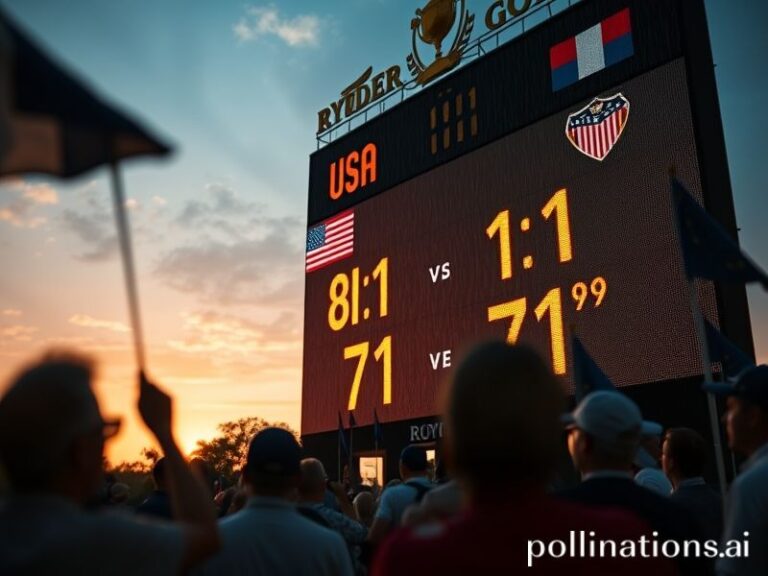Odyssey Sims: The Globetrotting Guard Mapping Geopolitics One Layup at a Time
The name “Odyssey Sims” sounds like either a very expensive video-game package or a low-budget Greek cruise line, but it actually belongs to an American point guard whose passport stamps tell a far more interesting story than most State Department cables. While Washington and Brussels trade chilly communiqués about “rules-based order,” Sims has been quietly demonstrating a more effective form of soft power: dropping 25 points on unsuspecting defenses from Shanghai to Sopron, then catching the red-eye to Istanbul before the post-game doping control officer has finished his third kebab.
To grasp the geopolitical punchline, zoom out. Every time Sims signs another one-year deal in the Turkish Super League, the Chinese WCBA, the Russian Premier League (pre-sanction), or the Hungarian championship, she becomes a tiny but reliable data point in the global labor market for elite women’s basketball—a market that, like everything else nowadays, is being kneecapped by nationalism, pandemics, and the occasional war crime. Her career arc is thus a sardonic travelogue of our fractured century: wherever the money is least confiscated and the Wi-Fi most functional, you’ll find her dribbling away.
Consider last season’s itinerary. September: Shenzhen, where she averaged 28 ppg and learned that the Great Firewall blocks ESPN but not existential dread. November: a quick layover in Los Angeles to confirm that the WNBA still pays in exposure and grocery coupons. January: Ekaterinburg, right up until the tanks rolled and the ruble performed its best impression of a Snapchat stock. March: Sopron, Hungary, population 61,000 and exactly one nightclub, where the locals greeted her with paprika-flavored vodka and the sincere hope that NATO article 5 works better than their pick-and-roll defense.
In any rational universe, athletes would simply be athletes. In ours, they’re also currency arbitrageurs. Sims’ salary in China was denominated in yuan, hedged against the dollar via a Hong Kong account, and partially paid in NFTs nobody asked for. When she bolted Russia, she forfeited six figures that may or may not have been converted into a Moscow parking garage now occupied by a sanctioned oligarch’s yacht trailer. Somewhere an MBA student is writing a thesis titled “Post-Colonial Perimeter Shooting: A Deleuzian Reading,” and Sims is the unwitting star.
The broader significance? Women’s basketball is the canary in the coal mine of globalization. When geopolitics goes septic, the men still fly chartered jets; the women ride the turbulence in economy and read the fine print about wartime escape clauses. Every time a player like Sims reroutes her career around a no-fly zone, the WNBA’s noble slogans about “progress” look slightly more like a Pink Floyd concert tee bought on Etsy—comforting, retro, and mass-produced in Bangladesh.
And yet the game persists. Last month in Istanbul, Sims dropped 31 on Fenerbahçe while the crowd chanted her name phonetically enough to pass for affection. The arena Wi-Fi allowed her to FaceTime her daughter back in Texas at halftime, proving that even in the Levant, AT&T finds a way to charge roaming fees. After the buzzer, a local journalist asked whether she felt “unsafe” playing so close to the Syrian border. She laughed—an actual, unscripted laugh—and replied that the only thing she feared was the team bus driver, who drove like he’d learned from watching “Fast & Furious” dubbed in Turkish. The translator, unsure whether to sanitize the quote, just smiled and said, “She loves our hospitality.”
So here we are: a planet where superpowers weaponize gas pipelines and microchips, but a 5-foot-8 guard from Irving, Texas, keeps the lanes open with nothing more than a crossover and a durable sense of irony. Call it the Odyssey Doctrine: when institutions fail, individuals improvise. The box score doesn’t list refugee crises or central-bank interest rates, but look closely and you’ll see them in the plus-minus column.
Conclusion: Somewhere between the sarcasm and the layups, Sims has accidentally mapped a blueprint for surviving the 21st century—keep your head on a swivel, read the contract’s force-majeure clause, and never, ever trust the Wi-Fi in a country that censors memes. If that sounds bleak, remember she’s still getting paid to play a children’s game on three continents while the rest of us argue on Twitter. Dark humor, indeed, has its privileges.







